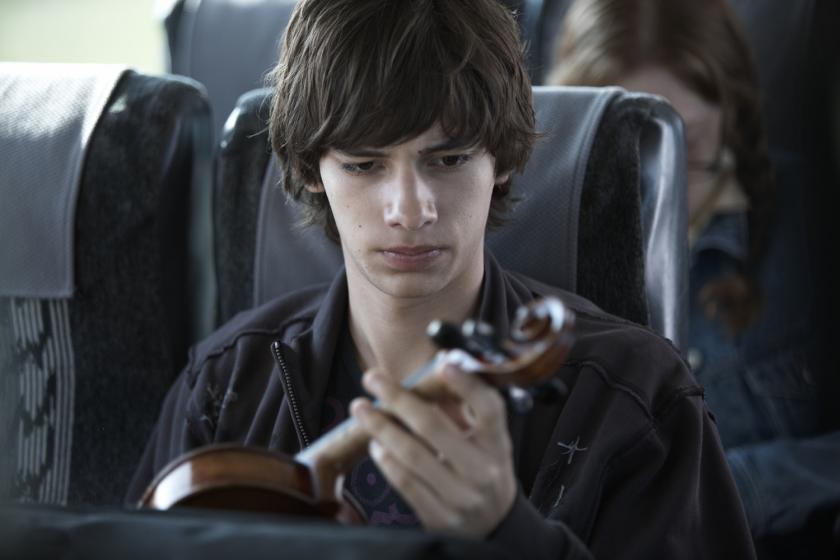This isn’t Atom Egoyan’s first road accident. In The Sweet Hereafter he portrayed the agony of a small rural community after a school bus crash deprives almost every household of its young, like some disembodied edict from King Herod. This time it’s the other way round: in Adoration a child has lost his parents to a mysterious car crash, leaving him and the uncle who brings him up to live in its long dark shadow. But that’s not the main difference between the two films. The Sweet Hereafter was based on a novel. Adoration is almost entirely a product of Egoyan’s imagination.
It was suggested by a news story about a man prepared to send his pregnant wife to her death in the name of jihad. Since Exotica, Egoyan's eyecatching early film set in a strip joint, the Canadian director has tended to work from more substantial sources. The Sweet Hereafter came from a novel by Russell Banks. For Felicia’s Journey it was William Trevor, and Where the Truth Lies (which baffled critics) from a book by Rupert Holmes. In a few weeks’ time comes Chloe, transliterated from Anne Fontaine’s French-language three-hander Nathalie. In short, Egoyan doesn’t often go it alone. And whenever he does, you kind of understand why.
He has always been a director for the slow reveal. Through thickly layered narratives he gradually unfurls the dark secrets of tormented souls. In Adoration, he puts that technique in the service of a cluttered debate about terrorism, faith, racial hatred, multiculturalism and ethnic identity. And let’s not forget the Holocaust cameo, a row of digits tattooed on an elderly Jewish woman’s forearm. It seems like a lot to ask of any film.
It all starts in class. Taking French dictation, Simon faithfully writes down the story of a failed plot to detonate a bomb mid-air. The mule for the explosive device is the pregnant wife of a husband who is not on the flight. Fired by the story, Simon (Devon Bostick) rips out the page and starts to rewrite it as if he were the child in the woman’s womb. In this version it was his Arabic father who attempted to murder his Christian mother along with 400 other passengers. Well, it’s one way of belatedly coming to terms with the death of two parents.
The question looms ever larger: where the hell is Egoyan going with this?
As part of a dramatic exercise, his teacher encourages him to present it as not fiction, but a truth. No sooner has he read it out in class than his entire e-community is yakking on about this trauma freshly unearthed from Simon’s past. There are nine of them in the chatroom, talking teenage heads on a screen divided into three rows of three. Society, Egoyan argues, has been atomised by cyberspace, pixillated into boxes from which entrenched loners spout babbling solipsisms.
Meanwhile, when news of the experiment gets out, the teacher Sabine is quite properly fired. She’s already been acting strangely, having visited the boy’s home disguised in full Arabic regalia, trying to bounce his uncle Tom (Scott Speedman) into a debate about religious and ethnic diversity. Being a tow-truck driver, he’s naturally wary.
As this odd trio of characters spark awkwardly off one another, the question looms ever larger: where the hell is Egoyan going with this? A revelation is duly made, family rifts exposed, the mystery of the car crash – accident? murder? suicide? – is unravelled. Then in a climactic auto-da-fé involving nativity figurines and a violin - his mother played violins, his father mended them - Simon comes by a highly symbolic means of laying ghosts to rest.
Still, the impression lingers that Egoyan has top-loaded a narrative which is too slender to bear such freight. He certainly asks too much of his characters. The other relative constant in the work is his wife, Arsinée Khanjian, an actress who crops up in most of his films (but who has been notably spared a lead role in Chloe, which requires a Vaseline-lensed Sapphic love scene of Julianne Moore and her co-star Amanda Seyfried). She might actually have preferred that to playing Sabine, whose opacity of motive leaves her with only one note to play.
You can sort of see what Egoyan is doing. Set on his regular patch of suburban snowbound Toronto, his sermon is that people from disparate backgrounds must come together more, that the earth must heal itself of wounds inherited from elders of every hue, and that to do so it must put away childish things, the alienating tools of technology. Fair enough. But the truest line comes near the beginning, when Sabine encourages Simon to work on his story as an exercise. “An exercise in what?” he says. Good question.
Watch an extended trailer with director interview:















Add comment